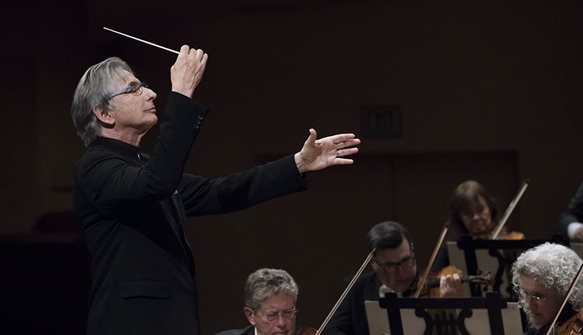
AT THE SYMPHONY, ANNE FRANK IS ALIVE AND WELL
However much the musical treatment of diarist Anne Frank might lean to positives, the reality of her legacy lies in the subliminal tragedy of her life and fate.
Composer Michael Tilson Thomas’ musical readings in the 40-minute “From the Diary of Anne Frank” are eloquently understated. In sound and style, the music director has clearly drunk from the same well as his mentor, the (symphonic) Leonard Bernstein. The orchestra interspersed phrases around diva Isabel Leonard’s narrations of Frank’s writing excerpts. The insightful, self-aware and eternally optimistic 13-year-old living in hiding had grappled with adolescence, relationships, confinement and persecution prior to being discovered and sent to a Nazi concentration camp where she died young.
The San Francisco Symphony had been waiting 25 years for the MTT opus. Previously scheduled in 1993, it was scuttled because of a musicians’ strike and reset for this, the maestro/composer’s finale year.
Full-orchestra flourishes power the beginning and end, as well as the giddy emotion at the text expectation “To be kissed!” But along the way are lengthy and eloquent/consonant pastorales fitting the words of wistful reflection and longing, plus somber moments injected to match “the march of death.” There are solos for English horn, piccolo, flute, oboe, cello and violin, beautifully carried out by the SFS musicians when heard Nov. 15.
Not surprising are the bits of Bernsteinian syncopation. MTT’s most innovative of all was the unorthodox interplay of solo bass trombone (John Engelkes) with the string section. The irony of the quasi-prisoner writing “I still believe people are really good at heart” is reflected in a stirring burst of orchestral dissonance.
The overall theme is a heavy one for the matinee audience, whose embers of applause barely illuminated Davies Hall. Bigger accolades went to Leonard, famous as an opera singer, now proving herself also to be one of the most sensitive narrators of recent years.
Conducting the program, MTT stretched out the tempos in both works generously, as is often the case for conductors approaching the three-quarter mark in life span. I timed his Beethoven “Eroica” at 52 minutes, and I’d like to say it was inspiring, especially given some of the instrumental high points: The legato-lyrical play of oboe soloist James Button in the Funeral March movement, and the 3rd horn entering surreptitiously “a measure too soon” at the 1st movements’ recap, which is often referred to as the most dramatic moment in all western musical history.
But no, this was a listless play-through of a great opus, perhaps with musicians who had poured all their emotion and energy into the Frank. Balances were also a difficulty; the loud pair of trumpets suggested the irreverent thought that this really was meant to be a Two-Trumpet Concerto.
Well, other orchestras have grappled with similar overachievers. Conductor-composer Richard Strauss had famously written halfway around the world: Before you give the downbeat, already the brass is too loud.
The concert program was tied to the 70th-anniversary celebration of the UN’s Universal Declaration of Human Rights and its theme of freedom of the individual citizen.
S.F. Symphony in music of Beethoven and Tilson Thomas, through Nov. 18, Davies Hall, S.F. For SFS info: (415) 864-6000, or go online.